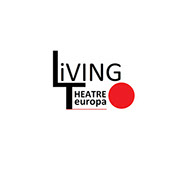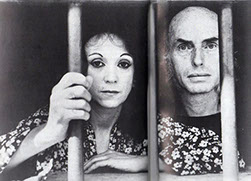

History of THE LIVING THEATRE
Experimental theater company founded in New York in 1947 by Julian Beck, set designer, painter and poet, and by actress and director Judith Malina, The Living Theatre is initially placed in the Off Broadway scene proposing an innovative repertoire of European twentieth-century and collaborating with more or less established young American authors. After the stormy beginnings, the Living achieved public and critical success with The Connection, a text by Gelber directed by Judith Malina staged in 1959. Following the controversies that arose following the premiere of the show The Brig in 1963 - a crude script by Kenneth H. Brown portraying life inside the military prisons of the Marine Corps – the Beck company is first forced to leave the space of the Theater on Fourteenth Street and then, in December of the same year, the country. In fact, the involvement in numerous pacifist demonstrations and civil disobedience initiatives earned the Living a notoriety that went well beyond the limited ambit of the avant-garde theater and which made it, precisely because of this political commitment, "unwelcome" by the government of the United States. Since the early 1960s, the Company has concentrated its activity in Europe - especially in Italy and France - with tours and long-term stays. From these years are the shows considered masterpieces of collective creation such as Mysteries and Smaller Pieces (1964), Antigone by Sophocles (1967) by Bertolt Brecht; Frankenstein and Paradise Now, presented at the Avignon Festival in 1968 amidst enthusiasm, scandals and controversies.
The so-called European Exile of the company is also the moment in which the Living lays the programmatic foundations of its theatrical work such as the rejection of the fiction of the stage, the elimination of the boundaries between art and life and, consequently, between actors and audience. The scenic language of the group is characterized in the gestural and bodily aspects, making use of a rigorous gymnastic-acrobatic research aimed at creating scenographic effects and aimed at the physical and emotional involvement of the audience. In the 1970s the group concentrated almost exclusively on street theater, creating shows with a very strong impact such as Seven Meditations on Political Sadomasochism (1973), The Money Tower (1975), Six Public Acts (1976) and then returned to the theater with Prometheus in Winter Palace (1978), Yellow Methuselah (1982), Archeology of Sleep (1983).
After Julian Beck's death in 1985 Judith Malina continues to lead the company together with Hanon Reznikov creating in the new space in New York shows such as The Tablets, I and I, The Body of God, Waste, Humanity, Rules of Civility, A German Requiem, Waste, Echoes of Justice, and The Zero Method. After the closure of the theater on Third Avenue in 1993 the Living, nomadic again, creates Anarchy, Utopia, Capital Changes, Not in My Name - an anti-death penalty play performed whenever a capital sentence is carried out and Utopia. In 1999 in Rocchetta Ligure, in the province of Alessandria, Centro Living Europa was born, the European headquarters of the Living Theatre. Here the company founded by Julian Beck and Judith Malina creates its most recent shows such as Capital Changes, Resistance, Enigma and Resist Now, presented in Genoa during the G8 and then in Germany and Lebanon.
The Rocchetta Ligure project was interrupted in 2003 and since then the director Gary Brackett, a member of the New York company, has been involved in promoting the company's work with training projects and productions that he creates with the Living Theatre Europa collective. In recent years, the collective maintained the form of traveling company by proposing workshops, shows and moments of confrontation and artistic, political and social discussion in Italy and Europe. It is under the guidance of Gary Brackett that the Living Theatre Europa realizes the experience of residential laboratory and street performance in the Occupied Territories, working side by side with Palestinian and Israeli artists, activists and social workers - experience collected in the documentary Mahloul, Journey to Palestine written and directed by Gary Brackett.